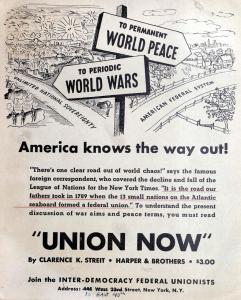
[Part 3 of 3]
Soon after its publication in 1939, Clarence Streit’s thought-provoking book, Union Now, became a popular topic of discussion nationwide. As we’ve described in the previous two posts, the book proposed the forming of a federal union of democratic republics in order to protect democracy from being overrun by totalitarian dictatorships. Chapters of the Federal Unionist Club were founded in cities across the country at a rapid pace; by 1941, sixty cities had established a local division of the club and many more were in the midst of starting up. In Pasadena, Linus and Ava Helen Pauling joined the city’s chapter of the club, which was dedicated not only to discussion among members, but also to working towards the goals established in Union Now.
Linus and Ava Helen’s decision to join the Federal Unionist Club was made in direct reaction to the events leading up to World War II. Raised in a large and politically engaged family, Ava Helen had seemingly always been a peace activist at heart. As the mother of four children however, Ava’s time for direct involvement was limited, and her membership in the Unionist club marked an important beginning of her public activism.
Linus, on the other hand, could have happily remained a research scientist for the rest of his days. But gradually he came to realize, with his wife’s help, that his scientific work would prove far more worthwhile if it served the public, and his involvement with the unionist cause likewise served as a first step in pursuing this aim.
By the late 1930s, the dynamic between scientists and world affairs had changed in such a way that Linus could not ignore the negative effects of political issues in the world. In particular, as the persecution of Jewish populations became more widespread, Jewish scientists were discharged from their positions and Linus began to receive pleas from Jewish colleagues in Europe, asking about any available positions at Caltech.
In the midst of changing times, Ava encouraged Linus to read Union Now, which he did. Linus quickly found himself coming into agreement with his wife, and concluded that taking action in favor of Streit’s proposal was – at least for the time being – a better option than passivity. In a letter to Professor Arthur Compton of the University of Chicago, Linus wrote that the state of current events was such that “I can not subscribe to such a policy of nonresistance.” Linus and Ava Helen thus became active in the struggle for peace.
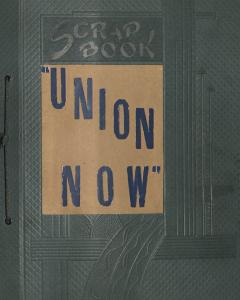
The cover of Ava Helen Pauling’s Union Now scrapbook.
As members of the Federal Unionist Club, Ava Helen and Linus played various roles. Ava Helen was more directly a leader, serving as the Pasadena chapter’s treasurer and historian. As such, she amassed the club’s financial records and kept track of their budget, which was mostly used to organize public debates and to purchase books and pamphlets summarizing Streit’s proposal. She also created a scrapbook consisting mainly of newspaper clippings that documented a great many club appearances in the press.
For Linus, club membership came with a less active but still important role, at least in the context of his own biography. Since the time of his graduation from Oregon Agricultural College, Pauling had felt the need to fashion his work in service to the general public. As a chemist in the post-World War I era, Linus was aware of the dangers that could arise when science was used for warfare, and thus had intended to stay tuned to events where his knowledge as a scientist could help prevent the use of chemistry for harm.
Now that a second world war loomed on the horizon, Ava Helen’s involvement with and care for the issues being discussed at club events offered Linus the chance to initiate his own involvement in world affairs. As we have pointed out earlier in this series of blog posts, the Pasadena Chapter of the Federal Unionist Club served as a forum for Linus to deliver his first important non-scientific speech, one in which he publicly stated his support for federal union and came prepared to answer questions regarding specific implications of Streit’s proposal.
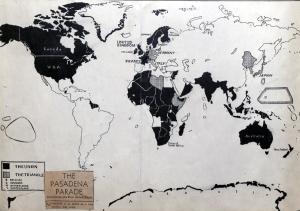
Map of Clarence Streit’s proposed federal union.
Though Linus and Ava Helen, in the minds of some, may have appeared to be supporting an unusual idea, Union Now was an unequivocal hit. The book received numerous positive reviews, including one published in The New York Times, which later listed Union Now as a best-seller.
Given its success, it is interesting to note that Clarence Streit had been forced to hold off on publishing Union Now until the eve of World War II. Prior to 1939, publishers had been unwilling to consider any sort of public release of the book – not only did they believe that it would not sell but they also feared that their presses would lose repute if Streit’s political ideas were interpreted as too controversial.
By 1939 however, the immediate threat of war had created an opportunity for the publication of Union Now, and the book was picked up by Harper & Brothers. Later that year, Time Magazine devoted an article to Union Now that suggested that the western world’s failure to accept Streit’s proposal would inevitably bring about war. Clearly his ideas has entered into the mainstream.
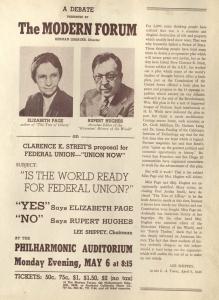
As copies of Union Now continued to be sold at a rapid clip, its proposal grew to be widely and passionately debated. Pamphlets and articles from the period reveal an interesting discursive battle between pro and anti-unionists, each side arguing against the other’s ideals and main proponents.
One prominent anti-unionist, Lillian Scott Troy, published a pamphlet titled “Union Now…Treason!” in which she stated that the true purpose of Union Now was to bring the United States back under British domination. This argument arose partly in the wake of Streit’s second book, Union Now With Britain (1941), in which he suggested that a smooth transition to federal union could begin with a union of Britain and other English-speaking democracies.
Though discredited by some foes as un-American, Federal Unionists thought of themselves as continuing the legacy of the founders of the United States, largely because they intended to extend the tenants of the U.S. Constitution to Britain, rather than bringing the U.S. under British rule. Troy’s arguments, in particular, were easily dismissed by Federal Unionists because of her questionable reputation. An American citizen, Troy had been deported from Britain for allegedly securing the release of Baron Louis von Horst, a convicted German spy.
That is not to say that unionists did not have contentious figures supporting their side. One such individual was Fyke Farmer, a close follower and supporter of the movement who, much like Troy, was surrounded by controversy. A Tennessee lawyer, Farmer came under national scrutiny in 1953 when he decided to defend Julius and Ethel Rosenberg, two Americans who were ultimately executed for treason, having been accused of sharing information about the U.S. nuclear program with the Soviet Union. Like Lillian Troy, Fyke Farmer was considered by his detractors to be a potential threat to the nation.
In spite of the negative press that sometimes appeared, Federal Unionists remained focused on their primary tactics – public discussion and distribution of print materials – to continue spreading the word of Streit’s proposals. This collective effort of Federal Unionist chapters around the country helped to repel the cries of opposition to unionism that sometimes arose.
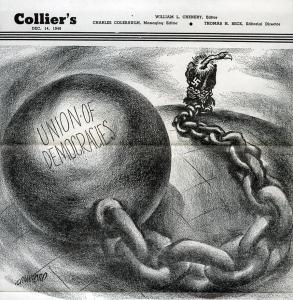
While the public clearly engaged deeply with the viability of the ideas presented in Union Now, the historical record would seem to indicate that the United States federal government, and international governments as well, paid little attention to the proposal. Nevertheless, Linus and Ava Helen’s records relating to the Federal Unionist Club offer unique insight into the beliefs and ideals of a collection of citizens who took action in the hopes that their efforts could change the fate of the nation and the world.
